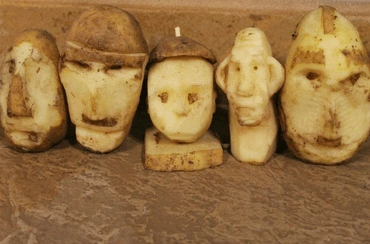1
How is the gold become dim, Changed the best -- the pure gold? Poured out are stones of the sanctuary At the head of all out-places.
2
The precious sons of Zion, Who are comparable with fine gold, How have they been reckoned earthen bottles, Work of the hands of a potter.
3
Even dragons have drawn out the breast, They have suckled their young ones, The daughter of my people is become cruel, Like the ostriches in a wilderness.
4
Cleaved hath the tongue of a suckling unto his palate with thirst, Infants asked bread, a dealer out they have none.
5
Those eating of dainties have been desolate in out-places, Those supported on scarlet have embraced dunghills.
6
And greater is the iniquity of the daughter of my people, Than the sin of Sodom, That was overturned as [in] a moment, And no hands were stayed on her.
7
Purer were her Nazarites than snow, Whiter than milk, ruddier of body than rubies, Of sapphire their form.
8
Darker than blackness hath been their visage, They have not been known in out-places, Cleaved hath their skin unto their bone, It hath withered -- it hath been as wood.
9
Better have been the pierced of a sword Than the pierced of famine, For these flow away, pierced through, Without the increase of the field.
10
The hands of merciful women have boiled their own children, They have been for food to them, In the destruction of the daughter of my people.
11
Completed hath Jehovah His fury, He hath poured out the fierceness of His anger, And he kindleth a fire in Zion, And it devoureth her foundations.
12
Believe not did the kings of earth, And any of the inhabitants of the world, That come would an adversary and enemy Into the gates of Jerusalem.
13
Because of the sins of her prophets, The iniquities of her priests, Who are shedding in her midst the blood of the righteous,
14
They have wandered naked in out-places, They have been polluted with blood, Without [any] being able to touch their clothing,
15
`Turn aside -- unclean,' they called to them, `Turn aside, turn aside, touch not,' For they fled -- yea, they have wandered, They have said among nations: `They do not add to sojourn.'
16
The face of Jehovah hath divided them, He doth not add to behold them, The face of priests they have not lifted up, Elders they have not favoured.
17
While we exist -- consumed are our eyes for our vain help, In our watch-tower we have watched for a nation [that] saveth not.
18
They have hunted our steps from going in our broad-places, Near hath been our end, fulfilled our days, For come hath our end.
19
Swifter have been our pursuers, Than the eagles of the heavens, On the mountains they have burned [after] us, In the wilderness they have laid wait for us.
20
The breath of our nostrils -- the anointed of Jehovah, Hath been captured in their pits, of whom we said: `In his shadow we do live among nations.'
21
Joy and rejoice, O daughter of Edom, Dwelling in the land of Uz, Even unto thee pass over doth a cup, Thou art drunk, and makest thyself naked.
22
Completed [is] thy iniquity, daughter of Zion, He doth not add to remove thee, He hath inspected thy iniquity, O daughter of Edom, He hath removed [thee] because of thy sins!







